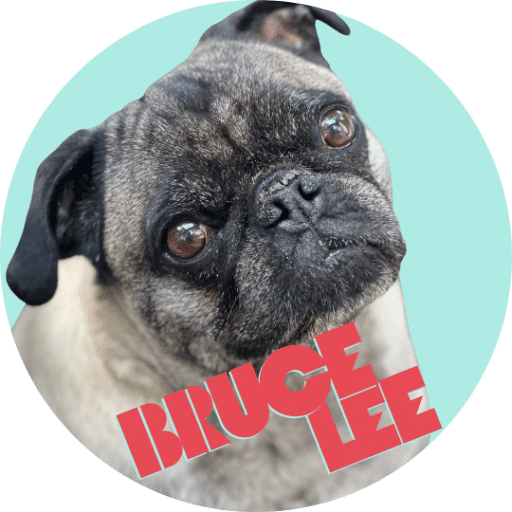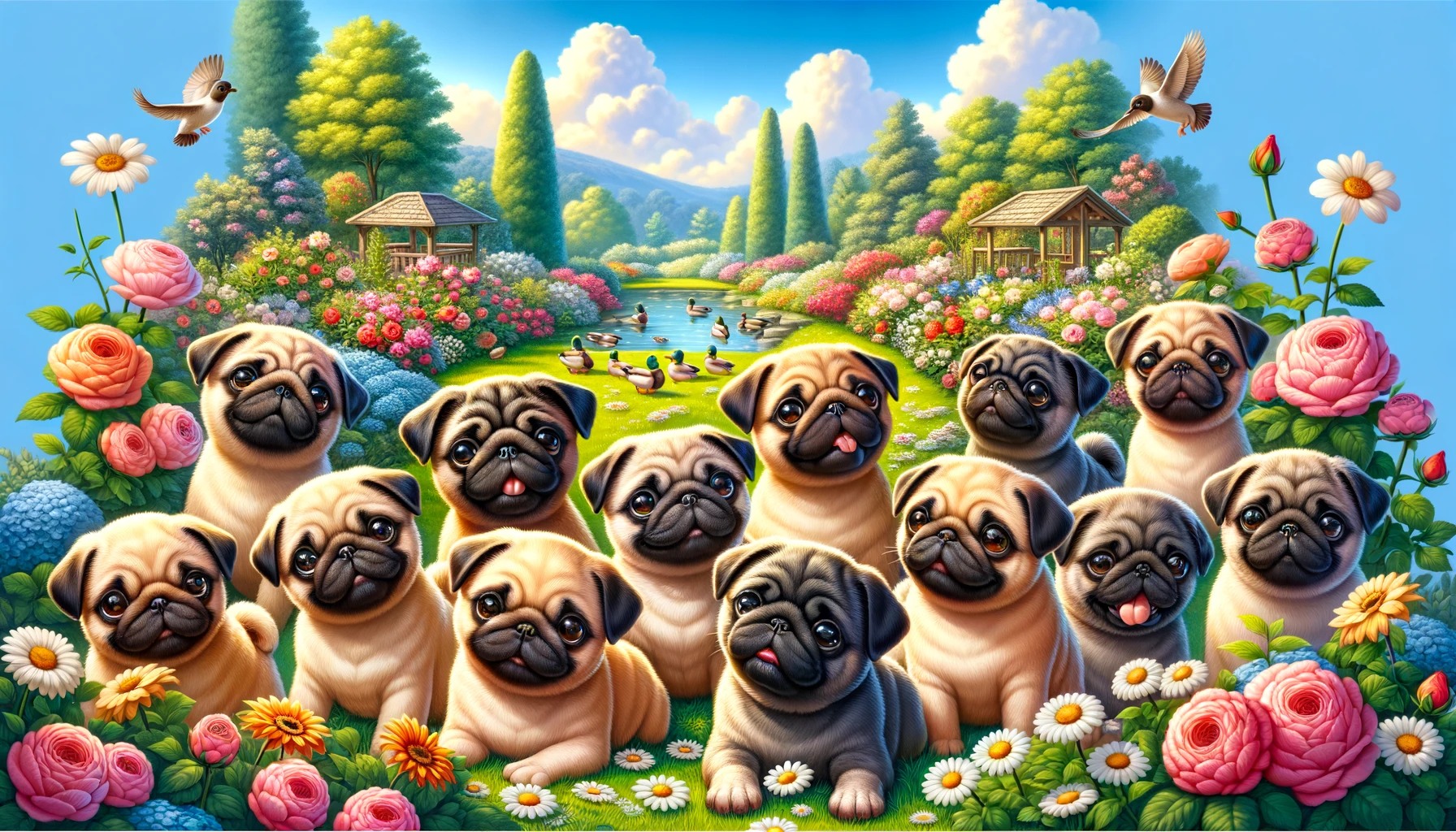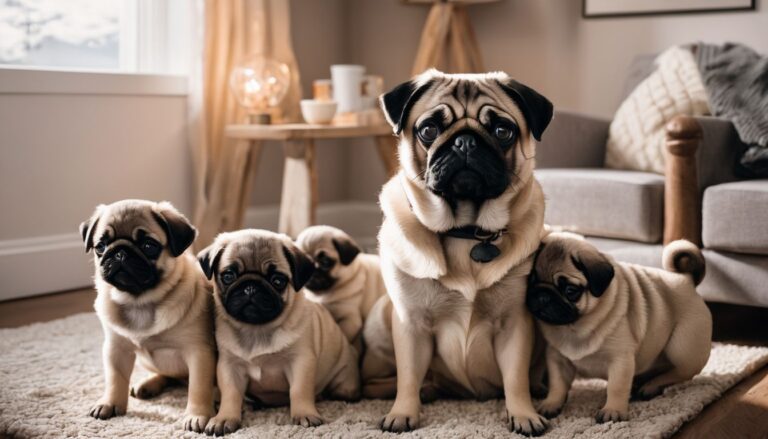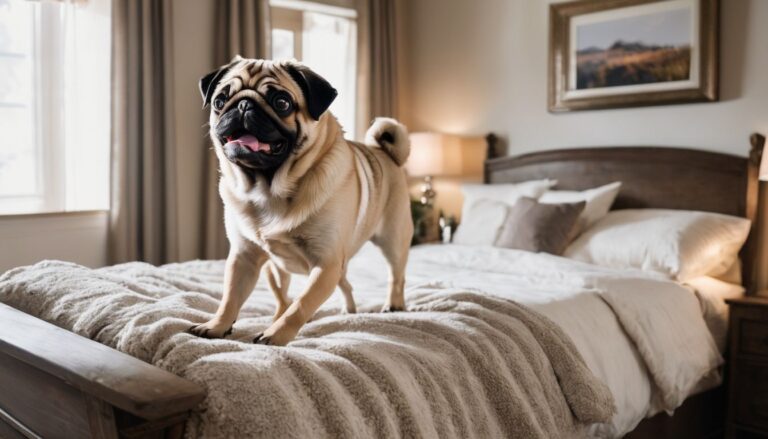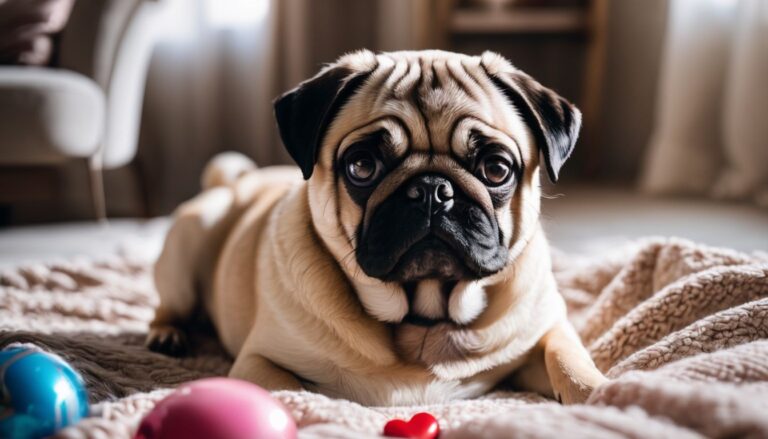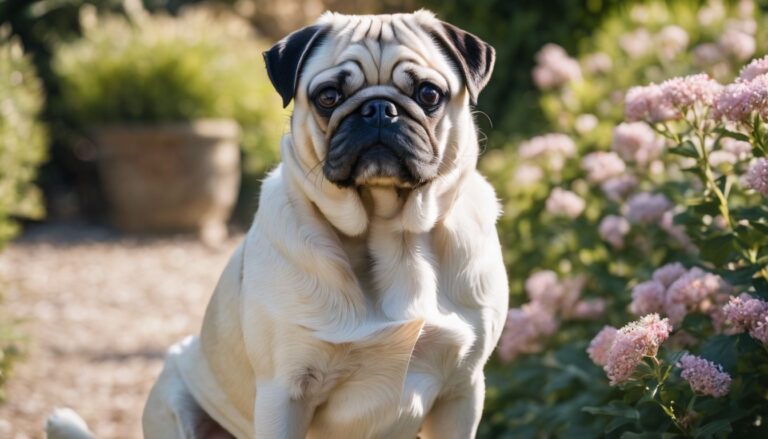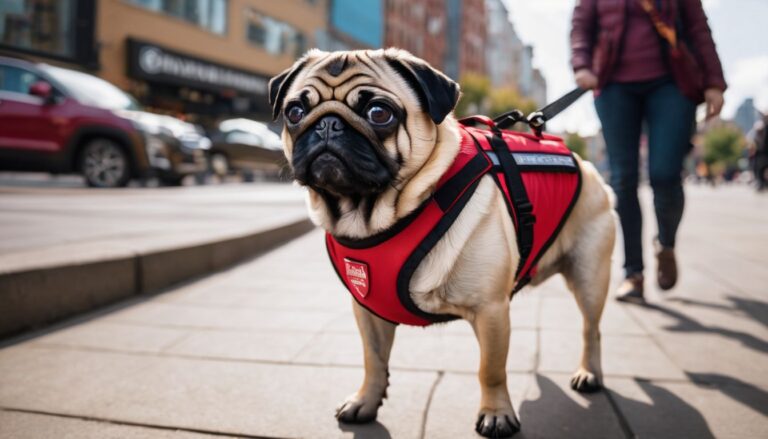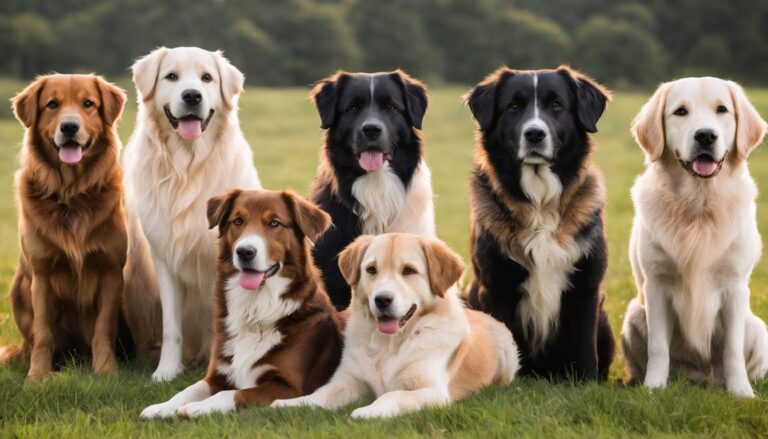Are Pugs Smelly? Discover the Surprising Truth About Pug Odor!
Demystifying Pug Odor
Pugs, with their adorable squished faces and charming demeanor, have captured hearts worldwide. However, they are often associated with a less-than-pleasant scent, leading many to wonder, “are pugs smelly?” and “do pugs smell?” These questions are common in discussions about pug odor, highlighting the importance of careful grooming in pet communities and veterinary offices. To be honest, Bruce Lee can clear a room with his gas, but we love him and do everything we can to keep his diet clean.
This odor issue, involving stinky pugs, has become a source of curiosity and occasional worry for pug owners, both current and prospective.
To delve into the world of pug smells, we aim to uncover the truth behind these claims. By examining the factors that contribute to their distinctive scent, such as skin folds and anal glands, we hope to assist you in managing and potentially mitigating any unwanted odors. This exploration will provide insights into how diet, health, and hygiene intersect with the inherent characteristics of pugs, impacting their overall aroma.
Key Takeaways:
- Pugs’ distinct scent is tied to their unique physical traits and health needs.
- Regular grooming and dietary considerations play critical roles in managing pug odor.
- Understanding and addressing health issues are key to fostering a fresher environment for pugs and their families.
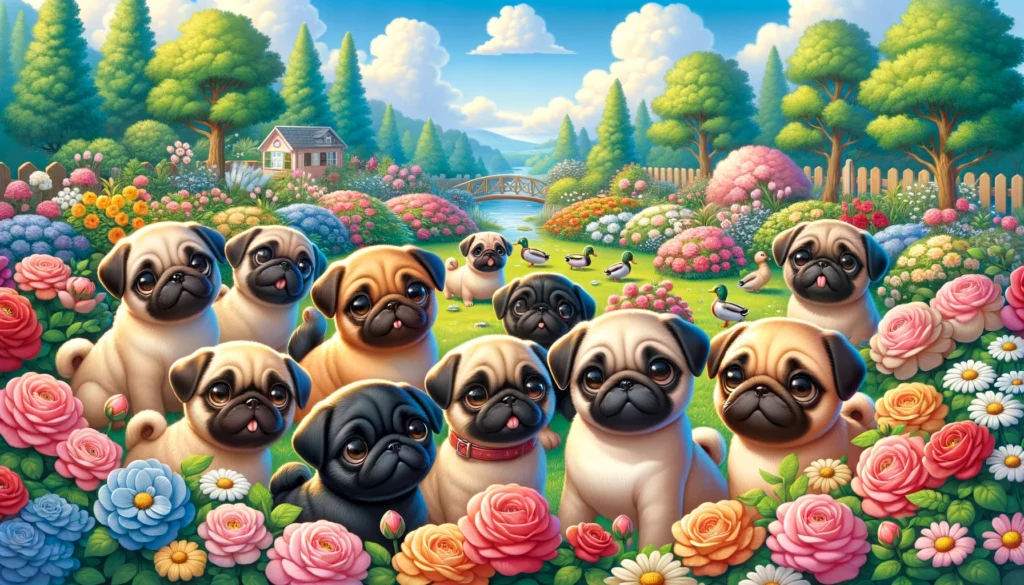
Are Pugs Smelly?
Pugs carry a distinct scent signature, influenced by their breed’s characteristics and grooming routines, leading to questions like “are pugs smelly?” and “do pugs smell?” Anal glands, often overlooked, can emit a potent odor if not expressed properly, reminiscent of fish. Skin folds, a defining feature of pugs, require regular attention to prevent the buildup of moisture and bacteria, which can contribute to their signature doggy smell.
Diet plays a crucial role in a pug’s aroma. Specific foods can increase bodily fluids that add to the well-known wet dog scent. Additionally, food sensitivities may lead to yeast infections in paw pads or skin, further contributing to their unique odor profile. Neglected ear care can result in ear infections, adding yet another layer to the array of smells pugs may emit. In essence, a complex interplay of genetics and care routines shapes the distinctive scent of our beloved pugs, making their odor as individual as their personalities.
The Role of Skin Folds
Pugs exude a unique charm, accentuated by their deep skin folds. While these folds are undeniably endearing, they can serve as breeding grounds for moisture and bacteria, often leading to the question, “do pugs smell?” Without proper care, these creases can indeed become sources of unwanted smells, affirming concerns about whether pugs are smelly. Regular cleaning has emerged as a vital strategy to address this concern.
Discussions have highlighted the effectiveness of incorporating a routine of gentle wiping and drying of these wrinkles, reducing bacteria presence. Maintaining dry and clean skin beneath the folds plays a significant role in ensuring a pleasant pug aroma.
This practice not only contributes to the dog’s overall well-being but also enhances the living experience. It was also noted that this proactive approach helps prevent yeast infections, which can worsen odor issues. These observations underscore the unequivocal importance of diligent grooming in preserving a pug’s health and scent profile.
Anal Gland Complications
Pugs often face concerns about their scent, leading to questions like “are pugs smelly?” and “do pugs smell?” due to their anal glands, located near their tail. These glands emit a unique doggy odor used for marking territory and identification. However, when these sacs become impacted or infected, the resulting smell can be overpowering. Effective management of these glands is essential to tackle odor problems. Veterinarians can express these glands to relieve discomfort and reduce the intensity of the scent.
Making dietary adjustments, such as incorporating high-fiber foods, can aid in preventing anal gland issues by promoting regular bowel movements and reducing gland pressure. Regular veterinary check-ups serve as a preventive measure, addressing potential infections before they worsen. By understanding and addressing anal gland concerns, we can maintain the distinctive charm of our pugs without the accompanying unpleasant smell.
Dietary Influences on Pug Odor
Many of us overlook the impact that diet has on our pugs’ body odor, raising the question, “do pugs smell?” Foods rich in certain ingredients can exacerbate their natural stink. For instance, diets heavy in fish or foods with strong odors can seep through their skin, intensifying their smell, leading to concerns about whether pugs are smelly. This fact became clear after we switched foods and noticed a significant change in their scent.
Feeding your pug a balanced diet could make a world of difference. Foods that support skin health and digestion help combat odor from the inside out. Yeast infections, often a source of strong smells, can be kept at bay with the right nutrition. We noticed that when we opted for foods with fewer fillers and artificial additives, not only did our pugs’ energy levels improve, but their coats smelled fresher for longer. This realization led us to scrutinize labels and choose options that contribute to their overall health and, subsequently, reduce undesirable odors.
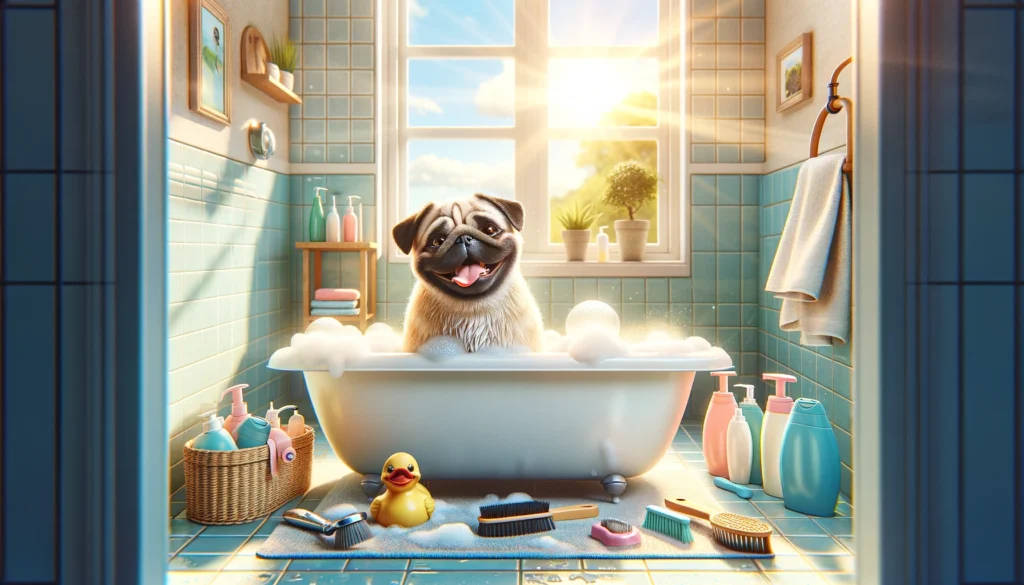
Bathing and Grooming Tips
Many owners often ponder, “Are pugs smelly? Do pugs smell?” Yes, they can, but we’ve discovered methods to minimize the stink. Pug odors originate from several sources: anal glands, skin folds, paw pads, and their natural dog smell, with a potential for ear infections. Diligence in grooming and bathing will significantly reduce these odors. Bathing your pug should be a monthly affair, or more frequently if they find themselves in a particularly messy situation. Yet, bathing too often strips essential oils, leading to skin irritation and potentially more smell.
Choosing the right products is key. Opt for gentle, hypoallergenic shampoos tailored for dogs with sensitive skin like pugs. Products targeting odor control can be beneficial, but never compromise on the health of your pug’s skin and coat. Focus on thoroughly cleaning the wrinkles and skin folds, as trapped moisture and bacteria here can lead to a serious stink.
Grooming extends beyond baths. Regularly cleaning their ears, paw pads, and dental care plays a crucial role in eliminating odors. Ear infection and yeast infections can contribute to a smelly pug. Thus, maintaining a routine check and clean of these areas will keep odors at bay and ensure your pug remains a delight to cuddle.
Choosing the Right Products
Finding the right grooming products will transform your pug’s natural musk into a more pleasant aroma, addressing concerns like “are pugs smelly?” and “do pugs smell?” We’ve discovered that shampoos containing natural ingredients like oatmeal and aloe vera not only cleanse but soothe a pug’s sensitive skin. These elements were essential in battling the stinky pug dilemma, ensuring that skin folds remained irritation-free and smelled fresh.
Our journey taught us that products aimed at controlling yeast infections are invaluable. Yeast often contributes to the notorious pug smell, thriving in the wrinkles and moist areas. Shampoos with antifungal properties became our allies, reducing odors significantly.
Regular use of paw and ear cleaners that are gentle yet effective in removing dirt and wax has been instrumental. These products have prevented the buildup of odors emanating from the paws and ears, regions prone to infections if neglected. We noted a marked difference in our pug’s overall smell after introducing dental care routines. Choices like enzymatic toothpaste formulated for dogs played a crucial role in improving breath odor, making those pug kisses all the more enjoyable.
Regular Cleaning of Ears and Paw Pads
Maintaining a pug’s hygiene involves more than just regular baths, especially when addressing concerns like “are pugs smelly?” and “do pugs smell?” We must pay close attention to their ears and paw pads, areas prone to harboring unpleasant smells. These spots can accumulate yeast and harbor infections if not cleaned frequently. A pug’s unique physiology makes them susceptible to these issues, with their compact size and characteristic wrinkles exacerbating the situation.
Ensuring these areas remain clean will significantly reduce the odors typically associated with pugs.
For us, the task involves gently wiping the ears and between the paw pads, using solutions formulated for dogs. This will fend off the risk of ear infections and keep the paws free from irritants that could lead to discomfort or worse, infection. Given pugs’ inclination towards developing skin and ear conditions, this form of preventive care has shown us it can make a world of difference in maintaining their overall health and curbing that notorious pug smell.
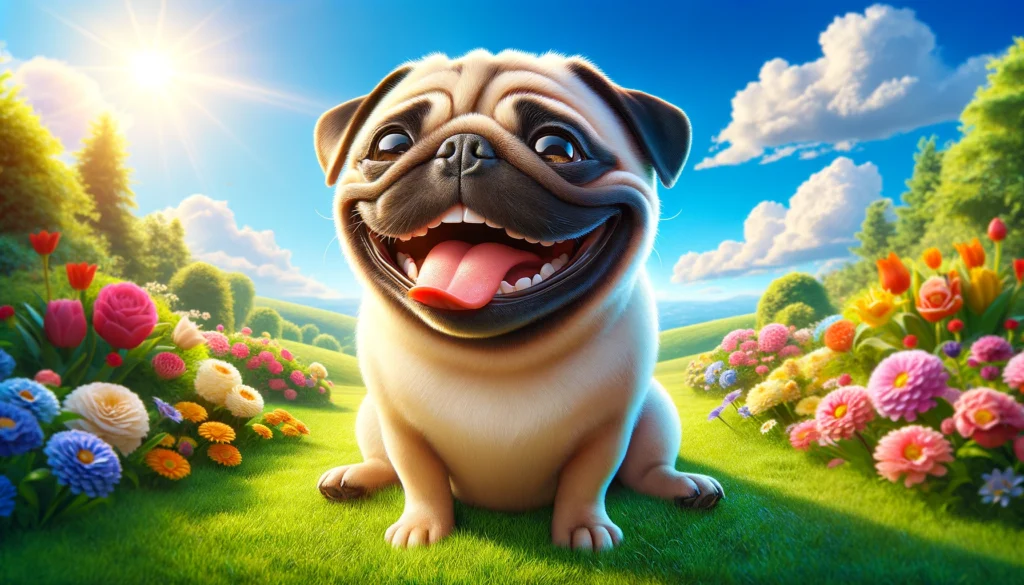
Dental Care for Fresh Breath
We often overlook the crucial role that dental care plays in a pug’s overall well-being, especially concerning its breath, raising questions like “do pugs smell?” and “are pugs smelly?” A pug’s mouth can harbor bacteria leading to plaque and tartar build-up if not consistently managed. This, in turn, contributes significantly to the pug smell, transforming what should be sweet kisses into less pleasant experiences. We have found dental sticks have seemed to help.
Incorporating dental checks into routine health checkups is a forward-thinking move. It ensures early detection of potential health issues such as gum disease or tooth decay, which can exacerbate odor problems.
Diet plays a pivotal role in maintaining fresh breath for our beloved pugs. Foods formulated to promote dental health can help reduce plaque. Choosing the right type of food has been shown to make a noticeable difference. Regular brushing of their teeth might sound daunting, but it will become an integral part of your pug’s grooming ritual over time.
In summary, dental hygiene is foundational to managing your pug’s natural odor. By dedicating a little time and effort to their dental health, we pave the way for fresher breath and a happier, healthier pug.
Managing Household Odors
Pugs, with their distinctive smell, often lead to questions like “are pugs smelly?” and “do pugs smell?” which can challenge our efforts to maintain a fresh home environment. Regular cleaning becomes our first ally in this battle, making a noticeable difference by reducing the accumulation of odors from skin, paws, and those notorious wrinkles. Air purifiers then enter the scene, proving their worth by capturing not just the odors but also the dander and hair that contribute to the house’s overall smell.
Regular grooming sessions for your pug can significantly help manage any smells.
They will not only keep the dog clean but also reduce the shedding that carries the smell throughout the house. Incorporating fabric treatments into our cleaning routine has been a game-changer. Specially formulated sprays break down the odor molecules trapped in sofas and carpets, rather than just masking them.
Finally, we learned that diet plays a crucial role. Foods that reduce yeast infections and promote healthy skin and coat can naturally minimize odors, promising a more fragrant future for both pugs and their owners.
Health Issues That Affect Odor
Dogs, including pugs, often challenge us with their odors, which aren’t always a delight, leading to concerns about whether pugs are smelly or do pugs smell. Health issues can significantly impact these odors, turning our beloved pets into little stink bombs. Ear infections and yeast infections stand as prime culprits in the battle against pug odor.
These conditions not only cause discomfort to our furry friends but also contribute to an unwanted aromatic presence in our homes.
Moisture finds a haven in the folds of a pug’s skin, creating an ideal environment for yeast and bacteria. These infections produce a distinctive smell that, once noticed, we find hard to ignore. The scenario gets worse when the issue involves the pug’s ears. Here, infections foster a breeding ground for bacteria and yeast, leading to an even more intense smell that combines with the natural dog odor to create a potent mix.
Prevention has always been better than the cure. Regular checkups with the vet play a crucial role in identifying and addressing these problems before they escalate. Through these visits, we can keep our pugs healthier, happier, and less smelly. Therefore, understanding the link between health issues and odor is vital for any pug owner aiming to improve not just their dog’s smell but also their quality of life.
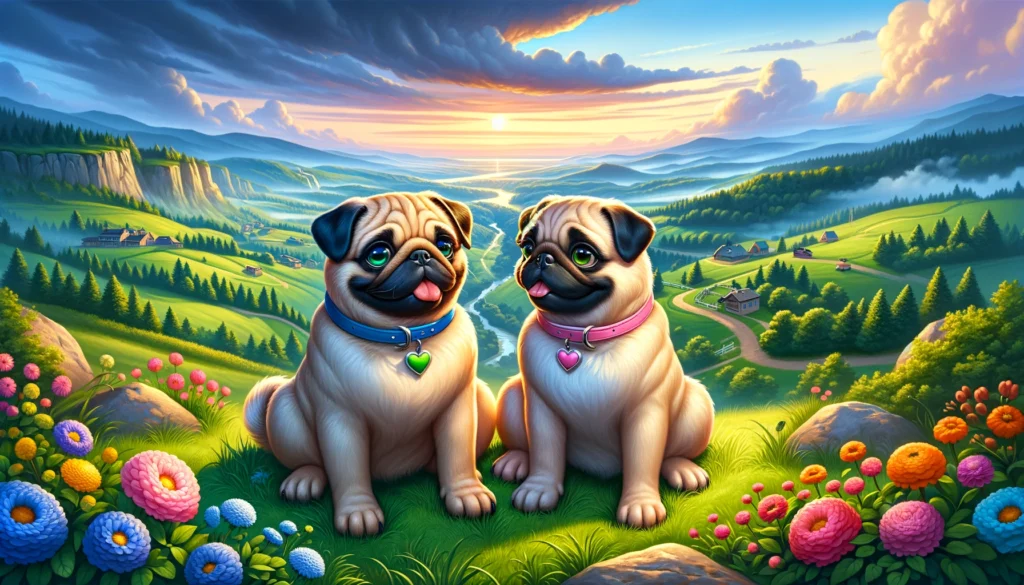
The Gender Odor Gap
Exploring the perplexing world of pug odor reveals an intriguing discussion – the variance between male and female pugs in terms of smell. We’ve stumbled upon a fascinating pattern; anecdotal evidence suggests a potential gender odor gap among these charming canines. Owners have often speculated whether the distinctiveness of a pug’s perfume might hinge on whether they’re a male or female.
Several contributors to forums and discussions have shared insights that lean towards male pugs emanating a slightly more pronounced scent. This could possibly be attributed to their natural body fluids and hormonal differences. Female pugs, on the other hand, are often noted for having a subtler, perhaps even sweeter nose feel, especially post grooming sessions.
However, common factors like skin folds and paw pads, where yeast infections and dirt accumulate, are universal concerns affecting odor in both genders. Anal glands, often a key player in the pungent perfume of canines, do not discriminate based on gender, requiring regular maintenance to prevent any unwelcome stink.
Yet, these observations should be taken with a grain of salt, as they stand more on individual experiences than scientific scrutiny. The need for regular cleaning, addressing possible ear infections, managing diet, and staying atop of health issues remains paramount in ensuring your pug’s scent remains as pleasant as possible, irrespective of being a male or female. Each pug’s odor tells a story, heavily influenced by their care routine rather than their gender.
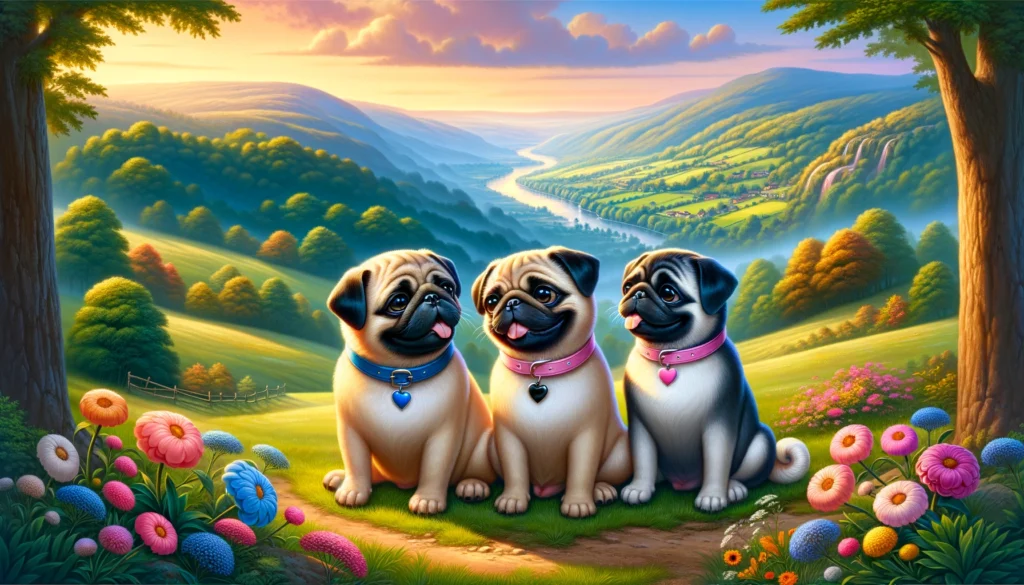
Fostering a Fragrant Future
We have journeyed through the aromatic landscape of the pug, uncovering the truth behind their distinct smell. From the folds of their skin harboring bacteria to the intricacies of their diet affecting their scent, the path to understanding pug odor has been enlightening.
We’ve explored various facets of their grooming and health, such as the cleaning of their ears and paw pads, the importance of dental care, and how to choose the right products. Our exploration didn’t shy away from discussing the more challenging aspects, like anal glands and health issues that can exacerbate odors. Through this journey, we’ve discovered that pugs do indeed have their unique perfume, a blend of natural dog smell influenced by several factors like anal gland issues, infections, and their distinctive skin folds.
We recognize that the quest for a fragrant future is ongoing. It demands our dedication to regular grooming, precise health care, and an openness to learn from each other. By sharing our experiences, whether it’s about managing wet dog smell after a rainy walk, or finding the perfect food that keeps our pug’s breath fresh, we contribute to a collective wisdom. This wisdom not only helps us tackle the stinky pug challenge but strengthens the bond we share with our four-legged companions and with fellow pug enthusiasts.
As we draw our discussions to a close, we invite you, our readers, to become part of this fragrant future.
Share the tips and tricks that have worked for you in reducing your pug’s smell.
- Have you found novel ways to keep those cute wrinkles clean without much fuss?
- Or maybe a special diet that keeps ear infections and yeast infections at bay?
Your contributions are invaluable. Together, we can ensure that our beloved pugs remain the charming, loving pets we know, albeit with a little less odor. Let us continue to engage, share, and support each other in our quest to understand and manage the mystique of pug odor. By doing so, we not only enhance our lives but also the lives of the pugs that enrich our days.
